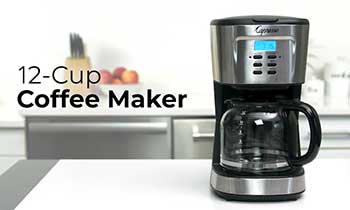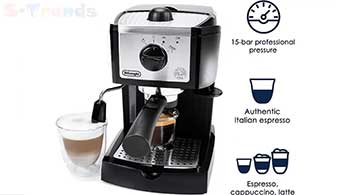For coffee lovers looking to bring cafe-quality espressos and lattes home, Capresso and DeLonghi are two of the top espresso machine brands to consider. Both companies make a range of home espresso makers at different price points. But which brand is better for your needs?
In this comprehensive guide, we’ll compare Capresso and DeLonghi espresso machines side-by-side, looking at key factors like features, performance, design, and value. Whether you’re on a budget or willing to splurge for premium espresso, read on for an in-depth look at how these two brands stack up.
A Brief Comparison Table
| Feature | Capresso | DeLonghi |
| Cost | More budget-friendly, starting under $100 | Slightly higher prices, starting around $150 |
| Espresso Quality | 15 bars of pressure produces good espresso | 19 bars of pressure creates richer espresso |
| Milk Frothing | Manual steam wands require technique | Models with automatic frothing for ease of use |
| Programming | Simple knobs and buttons | Digital displays for detailed customization |
| Ease of Use | Straightforward manual operation | More automation for convenience |
| Aesthetics | Utilitarian black/steel finish | Sleek contemporary designs |
| Reliability | Proven durability and longevity | Comparable reliability and owner satisfaction |
| Warranty | 1-2 years limited coverage | 2-3 years, extensive parts coverage |
Overview Of Capresso
Founded in 1994, Capresso is a US-based company focused solely on manufacturing coffee makers and other kitchen appliances. Their line of espresso machines ranges from entry-level semi-automatic models like the EC50 Pump Espresso and Cappuccino Machine to pricier super automatic machines like the Capresso Caffe Lucca.

Key features of Capresso espresso machines:
- Classic espresso preparation: Capresso machines use pressure and steam to brew rich, concentrated espresso from ground coffee. Models like the EC50 have a frothing wand for making cappuccinos and lattes.
- Beginner-friendly: Many Capresso models have programmable settings and buttons for one-touch preparation. Good options for espresso novices.
- Durable stainless steel construction: Commercial quality stainless steel housing and parts for longevity.
- Compact footprint: Great for small kitchens. Machines like the EC50 measure just 9.2 x 11.5 x 13 inches.
Overview Of DeLonghi
An Italian brand founded in 1902, DeLonghi offers a diverse range of home appliances including air conditioners, heaters, and kitchen gadgets. For espresso, they produce everything from basic pump espresso machines to sophisticated super automatic models.
Key features of DeLonghi espresso machines:

- Pump and steam pressure: Creates the 20+ bars of pressure needed for espresso and microfoam milk. Models like the Dedica Pump Espresso Machine have manual frothers.
- User-friendly operation: Machines have preset menus, one-touch programs, and other convenience features for ease of use. Good for beginners.
- Sleek contemporary styling: DeLonghi espresso makers have elegant, modern designs in black, stainless steel or silver plastic. Compact sizes.
- Advanced technology: Higher-end models have smart features like Bluetooth connectivity and adjustable brew settings.
Now let’s do a detailed comparison of how Capresso and DeLonghi espresso machines stack up across some key purchasing factors.
Espresso Quality & Performance
First and foremost, an espresso machine has to be able to brew cafe-quality espresso without bitterness or wateriness. Both Capresso and DeLonghi machines can produce rich crema and robust flavor when used properly. However, there are some differences:
Pressure
- Capresso machines typically operate at 15 bars of pressure, which is adequate for good espresso extraction. Models like the EC Pro pump the water through coffee grounds.
- Most DeLonghi machines create 19 bars of pressure for fuller espresso flavor and aroma. The pump system also allows adjusting the pressure.
Frothing Ability
- Entry-level Capresso machines have steam wands that require manual frothing of milk. Results vary based on skill.
- DeLonghi offers models like the Dedica that have manual frothers along with higher-end machines with automatic milk frothing for consistently frothed milk.
Brew Temperature
- Brewing water temperature is often not adjustable on Capresso machines. May impact flavor.
- More expensive DeLonghi models allow customizing water temperature for optimal extraction.
Ease of Use
- Capresso machines are straightforward to operate with clear buttons and settings. Good for beginners.
- DeLonghi machines excel at ease of use with pre-programmed buttons, digital displays, menus, and automatic functions.
For convenience and consistently high-quality espresso drinks, DeLonghi has an edge over Capresso. But avid do-it-yourselfers may appreciate the greater hands-on control of Capresso machines.
Design & Build Quality
Visual appeal and durability are important factors when investing in an espresso machine you’ll use daily for years. Here’s how Capresso and DeLonghi compare:
Aesthetics
- Capresso machines have a utilitarian look with boxy shapes, black/silver housings, and analog knobs. Less sleek than DeLonghi.
- Known for attractive contemporary styling with rounded corners, black/stainless housings, and digital displays. More modern aesthetic.
Build Materials
- Durable stainless steel used across Capresso product line for boiler housing and accents. Long-lasting.
- DeLonghi uses stainless steel and plastic exteriors depending on model. Internal boilers and parts are metal.
Size/Footprint
- Compact overall size of Capresso machines good for small kitchens. Average 11″ width.
- Slim DeLonghi machines like the Dedica fit in tight spaces at 5-6” wide. Larger models still under 11” wide.
Maintenance
- Capresso boilers and parts clean up nicely but require more user effort and supplies like tablets.
- DeLonghi super automatic machines have extensive internal cleaning functions for less maintenance.
If your priority is an espresso machine that looks sleek on your countertop, DeLonghi is probably the better choice. For maximum durability at an affordable price, Capresso is an excellent option.
Also Read: Is DeLonghi Stilosa Better Than EC155?
Cost And Value
With espresso machines ranging from under $100 to over $1,000, it’s important to consider what features you get at different price points.
Affordability
- Capresso has very competitively priced espresso machines between $100-$300. Great value for money.
- DeLonghi’s lowest cost models are priced comparably to Capresso, around $100-$200.
Features for Price
- With Capresso, you’ll get solid construction and reliability even at lower prices. Limited automatic features.
- DeLonghi offers more convenience-oriented features and higher-end performance for similar costs to Capresso.
Warranties
- Capresso offers 1-2 year limited warranties on most espresso machines. Provides replacement parts.
- DeLonghi provides 2-3 year warranties on espresso machines. Requires some maintenance not covered.
For shoppers on a tight budget, Capresso provides better simplicity and quality for the money. DeLonghi machines cost a bit more but have more features and accessories.
Ease Of Use
Making high-quality espresso drinks at home involves a learning curve. These brand both try to make the process as straightforward as possible.
Programming
- Capresso machines have simple knobs and analog buttons for basic on/off and programming functions.
- DeLonghi uses digital displays and electronic buttons to allow more detailed drink programming and customization for users.
Automation
- Fewer automated features on budget Capresso models. Users perform more manual steps like steaming milk.
- A range of automation from built-in milk frothing to self-cleaning on DeLonghi super automatic machines.
Maintenance
- Capresso requires more regular manual cleaning and descaling by users. Involves some disassembly.
- Higher-end DeLonghi models have extensive self-cleaning and descaling functions, reducing maintenance.
Ease of Cleaning
- With removable parts, Capresso machines are relatively easy for users to clean thoroughly after use.
- DeLonghi also has removable components. Internal cleaning functions on some models simplify the process.
For novices who want convenience, DeLonghi’s greater automation and self-cleaning capabilities make the machines slightly simpler to use consistently. But Capresso machines are still easy to operate with proper care and cleaning.
Reliability
An expensive, complex appliance like an espresso machine needs to deliver long-term reliability. Here’s how the brands compare:
Durability
- Capresso uses commercial grade internal parts that stand up well to daily use and last for years.
- Metal parts inside DeLonghi machines also provide durability. Plastic exteriors on some models may be less robust over time.
Component Quality
- Capresso machines use solid, heavy duty pumps, boilers, and other parts. Fewer fancy features to break.
- DeLonghi pumps produce high pressure. Internal workings vary from basic to more tech-heavy on some higher-end machines.
Ownership Experience
- Overall Capresso owners report very reliable performance even after years of daily use. Some exceptions.
- Most DeLonghi machines also have positive reliability feedback. Expensive to fix serious issues out of warranty.
Warranty Coverage
- Capresso provides 1-2 years coverage on defective parts. Limited labor coverage.
- DeLonghi offers 2-3 years on espresso machines covering more parts. Access to support is highly rated.
The reliability and longevity of Capresso and DeLonghi espresso machines are comparable based on actual owner experiences over years of use. Capresso repair costs may be lower out of warranty.
Also watch the video!
Frequently Asked Questions (FAQ)
Yes, Capresso is one of the top espresso machine brands for home use. They offer excellent performance, reliability, and durability at budget-friendly price points. Capresso machines are ideal for hands-on espresso enthusiasts.
DeLonghi is considered a very good brand for home espresso machines and other kitchen appliances. Their machines are praised for attractive styling, convenience-oriented features, and overall ease of use. So DeLonghi is a great option for beginners who want semi-automatic or super automatic espresso.
Higher-end DeLonghi espresso machines can cost $800+, partially because they contain advanced technology for automatically grinding, dosing, and frothing with the push of a button. These sophisticated super automatic machines also have self-cleaning functions and customizable settings that drive up the price.
Yes, DeLonghi is highly regarded for their pump espresso machines that create excellent homemade espresso. They also make quality drip coffee makers along with combination espresso/coffee machines. Models with burr coffee grinders integrated into the machine are some of DeLonghi’s best coffee makers.
The Verdict
After this detailed brand comparison, you hopefully have a clearer picture of Capresso and DeLonghi’s respective strengths and weaknesses for home espresso making. To recap the key points:
- For convenience and consistency, DeLonghi espresso machines edge out Capresso with greater automation, simpler digital programming, and self-cleaning functions.
- If budget value is your top concern, Capresso machines offer excellent performance and durability at very wallet-friendly prices.
- DeLonghi machines tend to have sleeker, more modern aesthetics compared to the utilitarian styling of Capresso products.
- Capresso and DeLonghi both provide long-term reliability, but Capresso machines may involve lower repair costs.
For serious manual control over every aspect of espresso preparation, avid coffee hobbyists might prefer Capresso. But DeLonghi machines are ideal for budding home baristas who want cafe-style drinks with less effort.
As you shop for your perfect espresso companion, consider which features and capabilities are an absolute must. Then take a look at models from both Capresso and DeLonghi to find your dream machine!

